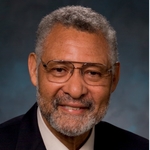Kennedy J. Reed

Kennedy J. Reed died June 20. He was 79.
Reed was born in Memphis, Tennessee in 1944 to Earl and Lula (née McClain) Reed. He grew up in the Ida B. Wells public housing of the south side Chicago where he developed an early interest in the sciences. He attended James R. Doolittle Jr. Grammar School, graduated from (then) Tilden Technical High School, earned his bachelor of science degree in physics from Monmouth College in 1967, a master of science degree in teaching in physics from the University of Wisconsin-Superior in 1971, and a Ph.D. in theoretical atomic physics from the University of Nebraska in 1978. He taught physics at Morehouse College in Atlanta from 1976-79 before joining Lawrence Livermore National Laboratory (LLNL) in 1980. He was a leading theoretical atomic physicist at LLNL, past president of the International Union of Pure and Applied Physics, and co-founder of the National Physical Science Consortium (now Graduate Fellowships for STEM Diversity) providing fellowships for women and minorities.
An expert in the application of computational relativistic atomic physics to collisional excitation and ionization phenomena in high temperature plasmas, he played an important role in the renaissance of atomic physics at LLNL and its application to X-ray lasers and inertial fusion. He authored more than 100 papers, working on both the computation of key atomic/plasma dynamical rates, and with the LLNL Electron Beam Ion Trap (EBIT) group and other X-ray spectroscopists, interpreting experiments aimed at elucidating complex atomic physics mechanisms.
In parallel with his work in atomic physics, Reed was deeply committed to improving the participation of underrepresented minorities and women in the physical sciences, helping more than 100 students earn their doctorates, often acting as a personal mentor.
Reed was president of the International Union of Pure and Applied Physics from 2017 to 2019. He also served on the National Academy of Sciences Board on International Scientific Organizations and was a charter fellow and previous president of the National Society of Black Physicists.
The Kennedy Reed Award for best theoretical research by a graduate student was established by the Far West section of the American Physical Society to honor Reed and his work.
In 2003, Reed received the American Physical Society’s John Wheatley Award for multifaceted contributions to the promotion of physics research and education in Africa. He became a fellow of the American Physical Society in 1999. In 2010, he received the Presidential Award for Excellence in Science, Mathematics, and Engineering Mentoring from President Obama in a White House ceremony. In 2011 he was elected fellow of the American Association for the Advancement of Science.
He is survived by his wife of 55 years, Jane (née Hensleigh), children Lewis and Lydia, son-in law Joshua Stewart, his younger siblings Juan, Garland, Margaret Davis and Lynn and, as one of his mentees described, “lots of physics grandkids.” He is predeceased by his parents Earl and Lula Reed and his older brother, Oye Ajanakou.




